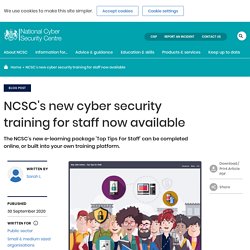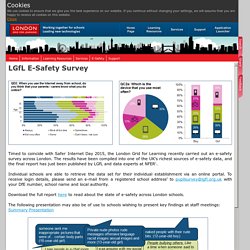

Safeguarding both adults and children online. Smartie the Penguin - Childnet. Our website, like most websites, uses cookies to distinguish you from other users.

This helps us to improve your experience when you browse our website and also allows us to improve our site. By using cookies, the website is essentially able to ‘remember’ you during a single visit to the site, known as session cookie or for repeat visits, known as persistent cookies. Necessary Cookies Necessary cookies enable core functionality such as page navigation and access to secure areas. The website cannot function properly without these cookies, and can only be disabled by changing your browser preferences. Analytics allow us to recognise and count the number of visitors and to see how visitors move around the site when they are using it. NCSC's new cyber security training for staff now available - NCSC.GOV.UK. The NCSC's recent work with small to medium sized enterprises (SMEs), charities, and the legal and accountancy sectors, has highlighted a key issue for those organisations.

There is so much cyber security advice available these days, many people find it hard to know where to start. Some organisations struggle to explain why cyber security is something that all staff should care about. Even larger organisations (with dedicated training resources) find it difficult to explain the technical aspects of cyber security in ways that are relevant to their staff, so that they can help keep their organisations (and themselves) safe from cyber attack. Equally, many SMEs and charities may not have the resources to put any cyber security policies and training in place at all, leaving staff exposed as their frontline defence against cyber attacks. For these reasons, the NCSC has produced a new e-learning training package: 'Stay Safe Online: Top Tips for Staff'. Online Safety Videos for Schools.
Parent Top Tips Safe Online Corona. 50731528BE51DC48620DA988F718F851. Changing behaviour - children, adolescents, and screen use. Sexting, internet safety loom large as childhood health concerns. (Reuters Health) - As more kids use mobile phones and surf the web at increasingly younger ages, sexting and Internet safety are becoming bigger childhood health concerns, edging out longtime worries like smoking and teen pregnancy, a new poll suggests.

Internet safety rose to become the fourth most commonly identified major problem in the 2015 C.S. Mott Children’s Hospital national poll on children’s health, up from eighth the year before, with 51 percent of adults this year citing it as a top concern. Sexting, meanwhile, was cited by 45 percent of adults and advanced to number six on the list of most pressing problems this year, from 13th place in 2014. “The public is well aware of the potential risks to children and teens of Internet activities and sexting, such as cyberbullying and predatory behavior,” poll director Dr.
Matthew Davis of the University of Michigan in Ann Arbor said by email. School violence ranked number eight, followed by teen pregnancy and stress. London Grid for Learning. Page Content Timed to coincide with Safer Internet Day 2015, the London Grid for Learning recently carried out an e-safety survey across London.

The results have been compiled into one of the UK's richest sources of e-safety data, and the final report has just been published by LGfL and data experts at NFER1. Individual schools are able to retrieve the data set for their individual establishment via an online portal. To receive login details, please send an e-mail from a registered school address2 to pupilsurvey@lgfl.org.uk with your DfE number, school name and local authority. Download the full report here to read about the state of e-safety across London schools. The following presentation may also be of use to schools wishing to present key findings at staff meetings: 2 For reasons of data protection, the details will be sent to the registered headteacher e-mail address for the headteacher to forward to the relevant member of staff Results of the 2013 survey.
SnapChat Bullying Tactics. Cyber bullying has become a serious issue with today’s teens and children.

These age groups often spend a significant amount of time online, doing homework and interacting with their friends. Learn about SnapChat Bullying Tactics! While bullying has previously been limited to in person encounters, it has now extended to online and other avenues. SnapChat is one of the fastest growing trends among teens, making it the ideal place for bullies to target their victims. According to CNBC, the app handles more than 200 million snaps every day. How Does SnapChat Work?
SnapChat is an app that is available on both android and Apple phones. No Evidence The biggest draw to using SnapChat as a cyber bullying technique is the fact that pictures and videos disappear within 10 seconds after being viewed. Spreads Much Faster Many times, bullies like to get as many people involved as possible.